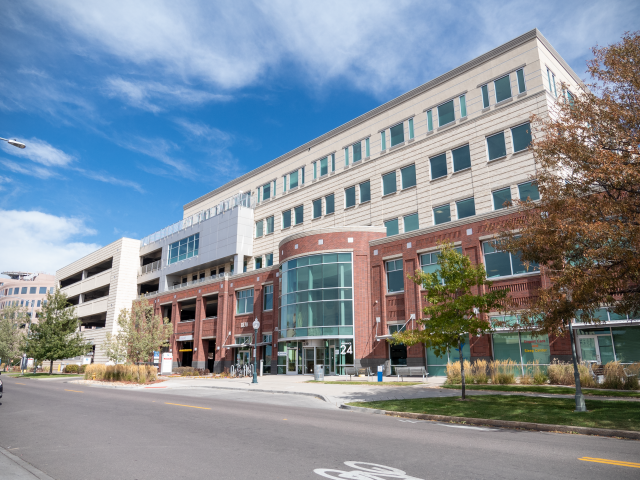
Find healing with the experts at Eating Recovery Center
Eating Recovery Center's (ERC’s) esteemed inpatient eating disorder treatment program provides:
- 24/7 nursing supervision
- Full-time primary care and psychiatric support
- Nutrition and psychotherapy services
Conveniently located near major medical campuses, ERC can provide a seamless transition to acute care if an emergency arises.

Real People. Real Stories. Real Progress.
Our expert care teams ensure people of all ages, races and gender identities get the exact support they need at each stage of their recovery. With the right care, lasting healing is possible – and we have the data to show it.
73% of patients no longer reported significant eating disorder symptoms
What is inpatient eating disorder treatment like at ERC?
- 24/7 medical support and supervision provided by nurses and behavioral health techs
- Full-time primary care physician and psychiatrist on staff
- Care for severe eating disorder symptoms, thoughts and behaviors
- Expertise in medically complex cases
- Intensive treatment unit (ITU) supporting patients with the most complex medical and behavioral comorbidities
- Access to local hospitals for urgent matters that can’t be handled on-site
- Staffed by experienced registered dietitians, therapists and physicians
- Individual, group and family eating disorder therapy and nutritional support
- Weight-inclusive, trauma-informed and gender-affirming care and LGBTQIA+ and BIPOC support
- The ability to meet complex medical and nutritional needs (our centers can utilize tube feeding support if that is what you need to recover)
Find Recovery with Evidence-Based Therapies

Programs for kids and teens
It can be incredibly stressful to watch someone you love become medically fragile as a result of their eating disorder. This is why ERC provides all levels of eating disorder care for teens and children ages 8-17.*
Kids and teens are well cared for at our child-friendly inpatient treatment centers, with regular contact provided by a treatment team composed of physicians, registered dietitians, therapists and other experienced professionals.
While your loved one is in our care, we provide caregivers with multiple support and education options to throughout the recovery journey and beyond.
*Ages vary by location.

Providing education support for your child
When a child is very ill, parents and caregivers often worry about how it will impact their education and schooling.
ERC offers ongoing educational support and dedicated time for schoolwork up to three hours per day, Monday through Friday, for children and adolescents in treatment.
Please reach out with any questions about educational support.

Programs for adults
As an adult living with an eating disorder, the struggles you are experiencing are real, and they do not define you. Entering an eating disorder treatment program can be challenging, but it is also the start of being heard, understood and healed. Here you will find the medical and nutritional support you need to recover.
In our adult inpatient eating disorder treatment program, we will encourage you to participate in therapeutic programming and interact within a supportive treatment community.

Programs for families and caregivers
We strongly encourage family involvement and offer many resources to support parents, caregivers and other support persons.
When your loved one begins treatment, we will teach you exactly what you need to know to support their recovery. Start connecting today by taking part in some of our programs for caregivers:
- Ongoing free virtual caregiver support groups
- Virtual Family & Friends Education Series
- Hope Orientation
- Eating Disorders 101
- Weekly nutrition education sessions with registered dietitians to discuss meal planning and your loved one’s progress
- Weekly family therapy sessions

Aftercare programs
Treatment may end but our support will continue. Our community outreach team will reach out to you periodically with phone calls, emails and invitations to join our alumni events and groups.
Connect with the tools you need before, during and after treatment, including:
Why Choose ERC?
Think of ERC’s continuum of care as a “golden thread” providing you with smooth transitions and consistency throughout treatment. ERC’s continuum of care team has been intentionally and carefully trained to:
- Get to know who you are as a whole person
- Provide consistent support that moves with you
- Reduce the risk of relapse during treatment
- Eliminate your stress in having to tell your story again and again
- Ensure access to medical and psychiatric experts in the eating disorders field
- Offer education and support to families and caregivers
- Increase the likelihood of insurance approving or extending your care
- Make sure that you have access to ongoing education, events and support groups after discharge
- Create seamless transitions with each level of care change
- Ensure uninterrupted connections with school (for child and adolescent patients)

Our continuum of care model ensures that you will be connected with the right support at the right time, from the initial assessment all the way through to aftercare.
Inpatient vs. residential eating disorder treatment
At both the inpatient and residential levels of care, patients live full time at the treatment center. While both levels of care provide medical and psychiatric stabilization, inpatient care takes place in a 24-hour specialized hospital setting to support individuals with more complex behavioral and medical comorbidities. Inpatient care also includes ERC’s intensive treatment unit (ITU) to provide urgent care for the most severe medical/behavioral symptoms.
Services provided
Both the inpatient and residential levels of care help individuals stabilize with the following services:
- Treatment of many medical complications and co-occurring conditions and illnesses
- Weight restoration to help the brain heal
- Direct psychiatric care and medication management provided by full-time primary care physicians and psychiatrists
- Nourishing meals (tube feeding available if needed)
- Social support
- Round-the-clock nursing supervision
As individuals become more medically stable in inpatient care, they can engage more fully in individual, group and family therapy, meal planning and other activities on site. When the time is right, ERC will help these individuals transition to residential care where they will spend more time each day in community meetings and therapeutic groups.
Wondering which level of care is right for you?
Our personalized approach to care starts with our first interaction. During your initial phone call, we’ll get to know your strengths and challenges, where you are in your journey and how we can help you move forward. Connect with our experienced team today.
Get matched with the exact support you need.
With one conversation, our mental health professionals will help you better understand what you’re going through and what you need.
We will meet you where you are, listen to your story in a therapeutic setting, and match you with the level of support that meets your struggle.

Eating disorder hospitalization
Extremely low-weight or malnourished patients may require intensive medical care prior to admission at ERC. In such circumstances, we partner with the ACUTE Center for Eating Disorders and Severe Malnutrition at Denver Health (ACUTE) where patients are provided world-class medical care in a hospital setting. ERC has a long history of facilitating many successful transitions from hospitalization at ACUTE to inpatient eating disorder treatment at our facility.
Conditions We Treat
-

Eating Disorders
An eating disorder is a treatable mental illness that includes a number of different symptoms, including extreme emotions, attitudes, and behaviors surrounding weight and food issues.
-

Anorexia
Anorexia nervosa is characterized by an obsessive fear of weight gain and a refusal to maintain a healthy body weight.
-

Atypical Anorexia
You can’t tell if someone has an eating disorder just by looking at them. See how atypical anorexia affects people in a variety of body shapes and sizes.
-

ARFID
ARFID is a lesser known eating disorder that frequently begins as early as infancy or childhood, but adults can also suffer.
-

Binge Eating Disorder
Binge eating disorder is characterized by frequent overeating – at least once a week for three months – combined with a lack of control, intense feelings of distress and several other characteristic behaviors.
-

Bulimia
Bulimia is characterized by patterns of bingeing and purging.
-

Compulsive Overeating
Compulsive overeating can involve binge eating and weight gain, but it can also involve other behaviors.
-

Diabulimia
The term diabulimia is used to describe the diagnosis of an eating disorder in an individual with type 1 diabetes. These patients intentionally misuse insulin for weight control.
-

OSFED
Some eating disorders do not meet all of the diagnostic criteria for specific diagnoses like anorexia nervosa and bulimia nervosa.
-

Orthorexia
Some people go to extremes to “eat clean” at all times. This may lead to a disordered eating pattern known as orthorexia.
Levels of Care Offered
-

Inpatient
Our Inpatient programming is designed to support adults, children and adolescents of all genders who are acutely ill and are experiencing medical and mood instability as a result of their eating disorder.
-

Residential
Within ERC Pathlight's step-down model of care, the Residential eating disorder treatment program as well as the Residential mood & anxiety treatment program offer medically stable patients a highly-structured and supportive 24-hour treatment environment.
-

Partial Hospitalization
Our Partial Hospitalization Program (PHP) offers some of the same intensity and structure of Residential mood, anxiety, and eating disorder treatment while providing additional opportunities to practice recovery outside of the controlled eating disorder treatment environment during evenings at home or in peer-supported apartment communities.
-

On-Site Intensive Outpatient Treatment
Our Intensive Outpatient program is a flexible mood, anxiety, and eating disorder treatment program that allows patients to work, go to school, or care for children during the day and sleep at home at night.
-

Virtual Intensive Outpatient - Eating Recovery At Home
ERC is removing the barriers that can keep patients with anorexia, bulimia, and other eating disorders from receiving treatment. Through telebehavioral health programming, Eating Recovery At Home (our virtual Intensive Outpatient Program) offers the same proven care as our in-person treatment centers.
Hide Last Child Layout Div






